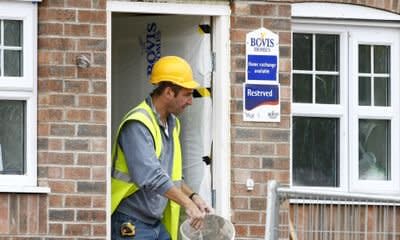Bovis approaches rival Galliford Try about housebuilding merger

Two of the UK's biggest housebuilders have kicked off secret talks about a tie-up just two years after a previous set of merger discussions broke down.
Sky News has learnt that Bovis Homes Group has approached Galliford Try in the last few weeks about a combination of a large chunk of their operations.
If consummated, a deal would represent a fresh catalyst for consolidation in Britain's housebuilding sector.
Bovis has a market value of just over £1.3bn, while Galliford Try, which owns the Linden Homes housebuilding brand, is worth roughly £550m.
Both are among the ten largest housebuilders in the UK.
City sources said this weekend that the prospect of a deal being reached between the two sides was unclear.
A Bovis insider cautioned that it was unlikely to be interested in Galliford Try's troubled construction division, which was responsible for a recent profit warning from the group.
They added that the construction arm could remain listed as a standalone company or be sold to a third party.
That would have implications for the structure of a transaction given that the construction unit - while beset by low margins - accounts for the largest part of Galliford Try's revenues.
If they were to pursue a full merger, a combined company could be valued by the stock market at about £2bn.
A significant chunk of any offer from Bovis for part or all of Galliford Try is likely to be in shares, sources suggested this weekend.
Galliford Try said last month that it would take a writedown of up to £40m on the unit because of costs relating to the Queensferry Crossing road bridge in Scotland.
The multimillion-pound hit was the latest example of pain being inflicted on UK construction groups, with Kier recently replacing its chief executive and finance director in the wake of an embarrassing reception for a rescue rights issue.
Last year's collapse of Carillion and the travails of Interserve, which owns a poorly performing construction business, underlined the crisis engulfing large swathes of the sector.
This week, Galliford Try said it would cut up to 350 jobs in its construction arm as part of a plan to streamline its focus.
That move was led by Graham Prothero, who took over as the company's chief executive in March.
His predecessor, Peter Truscott, quit to join rival housebuilder Crest Nicholson.
The approach from Bovis is a reversal of the situation in 2017, when Galliford Try sought to take over its then-smaller rival.
At the time, Bovis was struggling to reverse a stark decline caused by a crisis affecting the quality of new homes and its failure to meet construction targets.
Bovis eventually rejected offers from both Galliford Try and Redrow, another housebuilder, and recruited Greg Fitzgerald, Galliford Try's former boss, as its chief executive.
Mr Fitzgerald is understood to have engineered the latest attempt to combine the two companies' housebuilding operations, which would create a top-five player in the UK market.
Bovis may also be interested in Galliford Try's regeneration business, although the extent of that interest was unclear this weekend.
Mr Fitzgerald would almost certainly run the enlarged housebuilder that would emerge by adding Linden to Bovis's operations.
The approach from Bovis underlines the shift in the fortunes of the two companies, although both have seen their value slip during the last year.
Shares in Bovis are down almost 19% in that period, while Galliford Try's have slumped by well over 40%.
The two companies are likely to come under pressure to clarify details of their talks by the London Stock Exchange in the coming days.
During the previous round of talks in 2017, Galliford Try's investors were in line to receive just over half the equity in the merged business.
The approach from Bovis also comes at a sensitive time for the wider housebuilding sector, with rivals such as Persimmon coming under intense political pressure to justify profits made on the back of the government's Help To Buy scheme.
Bovis and Galliford Try both declined to comment on Saturday.

 Yahoo Finance
Yahoo Finance 